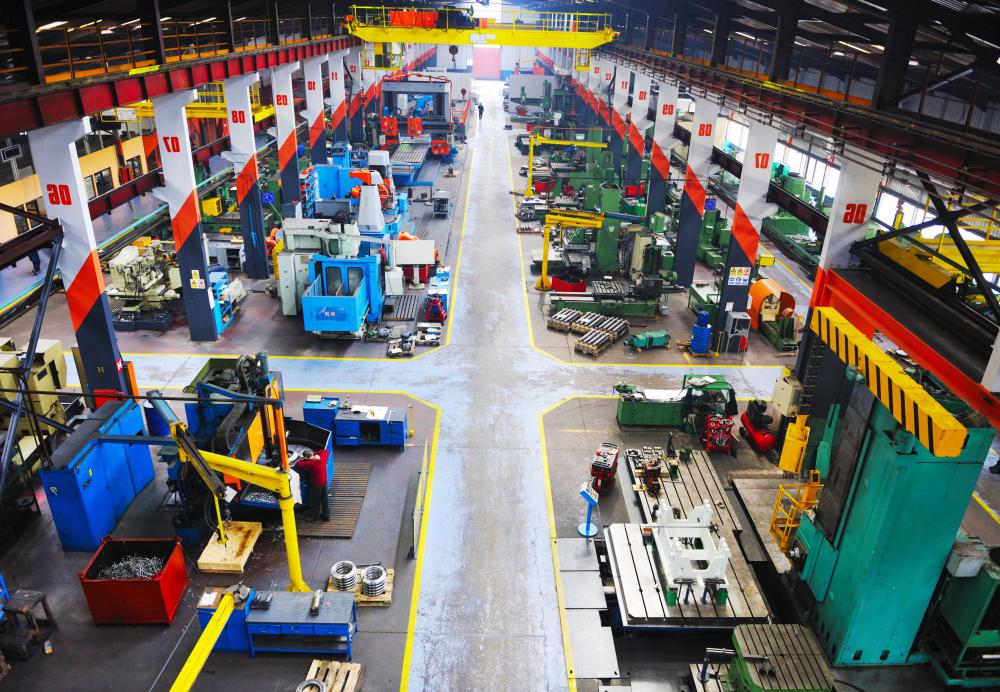At SmartCapitalMind, we're committed to delivering accurate, trustworthy information. Our expert-authored content is rigorously fact-checked and sourced from credible authorities. Discover how we uphold the highest standards in providing you with reliable knowledge.
What are the Differences Between a Factory Hand and an Office Worker?
Factory hands and office workers work in very different environments and do very different jobs. A factory hand usually works in a warehouse, while an office worker is employed in an office environment. Most factory workers assemble or package goods, while most office workers deal with preparing and/or analyzing information.
Another name for those who work in warehouses are assemblers or process workers. They put together parts to form a whole item or work on a specific sub-system of a whole item. These individuals may work in a production line in a factory or in a section of a warehouse. Uniforms and safety gear, such as gloves or protective eyewear, may be required.

Office workers do not usually need uniforms or safety materials. They are usually expected to wear clothing suitable for an office, such as a dress shirt and slacks for men and a blouse and slacks or a skirt for women. Some offices are more casual than others, and it is up to the individual employee to dress in a way that fits in with the particular office culture.

Some office workers sit in a cubicle in front of a computer for most of the day, while factory workers usually stand or are physically active all day. A file clerk in an office may stand for most of the day, however, and some factory workers may sit. Office workers may enter information into a computer or gather information from a computer to complete written tasks, while process workers often use computers only for inventory or assembly-related purposes.

In addition to manual assembly work, factory hands may also clean machinery, check for defects in products, pack and stack boxes, and load and unload materials. Office workers do not usually do any type of cleaning or physical labor. They are often more concerned with mental activities such as balancing an account, making a sale, or writing a report.
Both tyeps of employees may do repetitive tasks. Sometimes, they alternate their jobs with other workers to avoid doing exactly the same thing each day. They also both need to be team players who can follow instructions well.
AS FEATURED ON:
AS FEATURED ON:














Discussion Comments
I work in an office myself, but the manufacturing division is right next door. My supervisor thought it would be a good idea if we spent a day working alongside the factory hands. He thought we needed to understand what people go through in order to produce the things we sell and service.
I got assigned to a production line, and one of the factory guys spent two minutes showing me how to put a small part on a machine and then stamp it with a rivet. For the next two hours, I sat in front of this riveting machine and fed parts into it. It was mind-numbingly boring, and I couldn't imagine doing this for eight hours a day, five days a week. But then again, I suppose some people couldn't imagine entering codes into a computer all day, either.
I came away with a greater appreciation for what our blue collar employees do every day. I can negotiate a contract with a client for 100,000 parts a year, but now I know what it takes to actually produce all of those parts in the factory.
I've been both a factory hand and an office worker, and I think both have their advantages and disadvantages. When I was working on an assembly line, I'd see these people in the office with their white shirts and ties and think they had it made. They didn't do the same boring thing every day, and they probably earned a lot more money than I ever would.
A few years later, I got hired as a customer service representative at the same company and I started thinking the same thing about the factory workers. They could just come in, do their work and go home. They didn't have to deal with angry customers all day, and they could leave their work behind them. I was constantly worried about what would happen the next day.
I think both office workers and factory hands have days when they would gladly switch places.
Post your comments